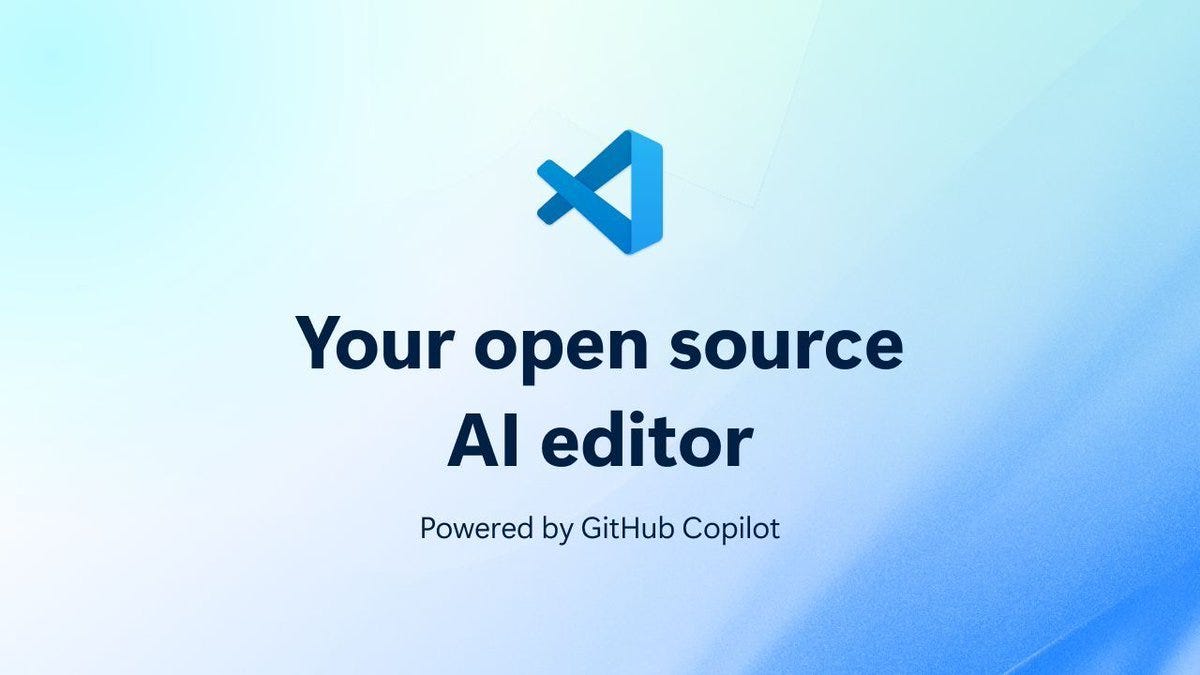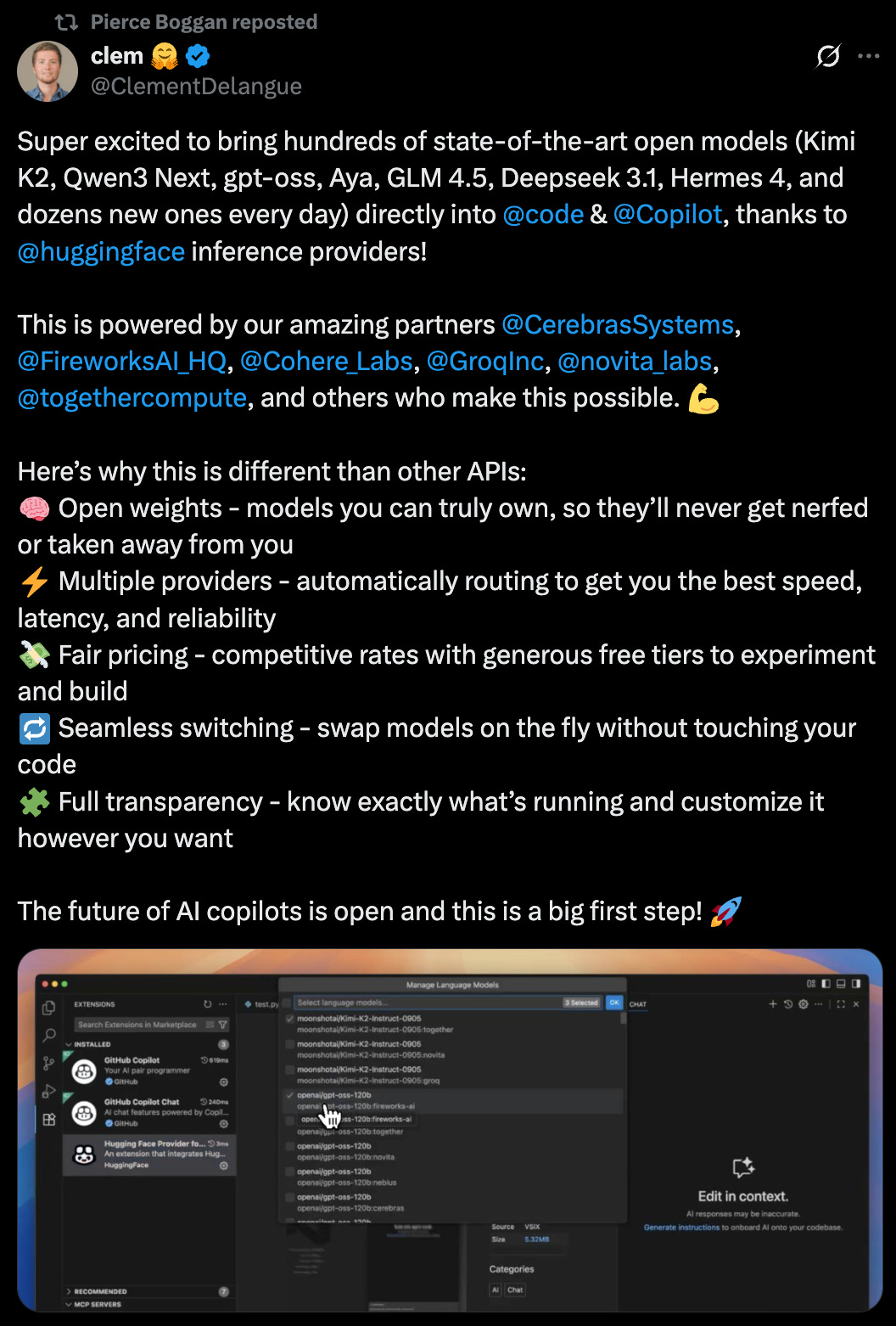Leading VS Code Through the AI Revolution
A Conversation with Pierce Boggan, PM Lead for VS Code and GitHub Copilot
Eleanor recently spoke with Pierce Boggan, PM lead for Visual Studio Code and GitHub Copilot, about navigating the rapid transformation of developer tools in the age of AI. Pierce joined the VS Code team in December at a pivotal moment when AI is fundamentally changing how developers write software.
From Acquisition to AI Leadership
Pierce brings extensive developer tooling experience to his role. He joined Microsoft through the acquisition of Xamarin, a cross-platform mobile development company, and has worked on languages like .NET and TypeScript, developer tools including Visual Studio, and Azure services. Before becoming PM lead, he even built VS Code extensions — giving him firsthand experience with the platform he now helps shape.
"I joined the team last December. So I'm actually relatively new to the VS Code team. The VS Code team has been very stable throughout its history and so I'm actually one of the more recent additions to the team."
Making Decisions at Scale
Leading the world's most popular code editor comes with unique challenges. Pierce explained how the team balances bottom-up planning from engineers who deeply understand their domains with high-level strategic assumptions about where development is heading.
"We do kind of this bottom-up planning approach where every single engineer for their area is bringing features up. And then also like Kai and I will meet and we'll say, okay, like you know, what are our assumptions in this space?"
The team's rapid iteration cycle — shipping daily to VS Code Insiders and monthly stable releases — allows them to recover quickly from mistakes. This approach has proven particularly valuable during the current period of rapid AI innovation.
"The nice thing is it's very a bad planning mistake is actually not quite as bad as like maybe another product because when you have these rapid iteration cycles, right, it's very easy to learn and recover from from kind of missteps that you take."
The Importance of Developer Empathy
Pierce emphasized that building great developer tools requires more than data and feedback themes — it requires genuine empathy and taste. The VS Code team consists of developers building for themselves, which creates a powerful feedback loop.
"All of us are developers, right, building for ourselves. And if anything in the product feels off, like we get personally pissed off about it. We're like, I don't like how that UX works. Like let's talk about it, right? Let's make it better."
Commitment to Openness
VS Code's commitment to open source and standards has become even more important as AI transforms development. Pierce described how the team faced a "narrative violation" when closed-source AI tools entered their traditionally open ecosystem. Their response was to double down on openness — open-sourcing Copilot Chat and enabling providers to contribute their own model extensions.
"VS Code is open source. We think the future is this AI stuff, but this AI stuff is closed source right now, right? And so, you know, separate from even like, you know, the business, the product, the community, like I think all of us like as people who their whole reason we work here is because we believe so much in this product and openness."
The recent move from "bring your own key" to allowing providers to package their models as extensions exemplifies this platform approach. Partners like Hugging Face and Cerebras Systems are already building on these APIs, giving developers choice in their AI tools.
Designing for Different AI Workflows
Pierce discussed the challenges of designing for both interactive and autonomous AI workflows. Local agents in VS Code allow developers to steer and correct course in real-time, while remote coding agents require different considerations around delegation and asynchronous work.
"When you're delegating something, like you're not, you don't have to synchronously view what's that's the whole point of delegation, right? And so then it's like, okay, things like reasoning, right? You can really kind of play with different reasoning efforts."
The team assumes developers will use multiple agents from various providers, positioning VS Code as the central workbench for managing these interactions. Recent features like the chat sessions view help developers track their various agent interactions in one place.
Changing Developer Behaviors
One of the biggest challenges is helping developers adapt to fundamentally new ways of working. Pierce noted that while features like ghost text suggestions allow developers to work mostly the same way, agents require significant behavior change.
"When you think about agents, like, okay, immediately we show the chat view, right? Like you open the secondary sidebar. Okay, what the heck do I type in this thing, right?"
Pierce shared his own multi-agent workflow for building an AI coloring book app for his children, where he runs four or five agents simultaneously with the same prompt, compares outputs, and synthesizes the best elements into a new agent run. This represents a completely different development pattern than traditional coding.
"I used to do X thing, but now I can do Y thing that wasn't, like it's a totally different way of working. I never imagined was possible."
The Joy of Development
Throughout the conversation, Pierce emphasized the importance of maintaining joy in the development process. While agents can dramatically increase productivity, the team is conscious of not turning developers into mere code reviewers.
"We all want to enjoy what we do, right? We came developers because we love developing things. And like, so keeping that joy in the process is super important to us."
Looking Ahead
Pierce expressed excitement about how AI enables exploration of new languages and technologies that would have been too time-consuming to learn traditionally. He shared how he's built Swift apps despite not being able to write Swift code from scratch — the AI handles the writing while he can read and guide the output.
The pace of change continues to accelerate, with new models shipping weekly rather than monthly. Pierce acknowledged the challenge and excitement of this uncertainty:
"Even thinking like two months ahead is hard, thinking six months ahead is really hard and thinking a year ahead you're like, I have no idea. And kind of accepting like having the humility to be like, I don't have any idea is in some ways like the best thing you can do."
Key Takeaways
Pierce's conversation revealed several important themes shaping VS Code's evolution:
Rapid iteration and learning — The team ships daily and embraces mistakes as learning opportunities
Platform thinking — VS Code serves as an open platform for multiple AI providers and agents
Developer empathy — The team builds tools they want to use themselves
Behavioral adaptation — Success requires helping developers learn fundamentally new workflows
Maintaining joy — Productivity gains shouldn't come at the expense of developer satisfaction
As Pierce noted, developers are uniquely positioned for this moment of change.
"The tech that I work on today in five years, like that might be obsolete. That's just the way it works as a developer. So in many ways we're just kind of conditioned to to be very good for this moment actually."
The VS Code team's approach — combining openness, rapid iteration, and deep developer empathy — positions them to help developers navigate the ongoing AI transformation while maintaining the joy and creativity that drew them to programming in the first place.
⚡ Moving from “vibe coding“ to professional AI-powered software development is one of the greatest opportunities for real quality and productivity boosts from AI. It requires a more deliberate approach, and some new techniques, but is an important addition to the toolbox of developers and engineering and product leads moving to an AI-native Software Development Lifecycle.
Our course, Elite AI-Assisted Coding covers these techniques in depth. Join us for a 3 week (12 live sessions) in-depth study of everything you need to build production-grade software with AI.



